
Transcription
Brennan Center For Justice
April 6, 2020
The Honorable Governors of the fifty states
Re: Governors' Executive Authority to Release Vulnerable People Who Pose No Risk to Public Safety from Incarceration
To the Honorable Governors oft he fifty state:
We recognize that these are unprecedented times and that all of you are at the front lines dealing with the greatest public health crisis of our generation. As of today, the United States has reported that over 200,000 people have tested positive for Covid-19, with over 4,000 deaths nationwide. (1) In fact, the United States currently has the highest number of reported Covid-19 infections in the world, with many cases still undetected. Based on our current inability to treat this novel virus and its extremely contagious nature, state and local leaders across the nation have made difficult policy decisions to protect the public to the best of their ability: issuing stay-at-home and shelter-in-place orders, closing doors to non-essential businesses, and providing guidance about social distancing - all in the interest of public safety.
However, the almost 2 million people behind bars at the county and state level plus the thousands of employees who work in correctional institutions, face an even greater risk of illness and death than the general public. We write today to urge you to use your full authority as Governors to release as many people as possible from incarceration, provided they do not pose serious public safety threats, for the duration of the pandemic. This effort should focus on people who are especially vulnerable to infection. Specifically, we recommend you take the following steps, which we explain depth below:
-Make full use of your clemency authority to commute the sentences of vulnerable people to time served, allowing their immediate release, or fashion other appropriate relief;
-Expand your States' "good time credit" or equivalent programs to reduce overall incarceration;
[Footnote: (1)"COVID-19 Map: Coronavirus COVID-19 Global Cases," Center for Systems Science and Engineering (CSSE) at John Hopkins University, last accessed April 1, 2020, https://coronavirus.jhu.edu/map.html.]
-Work with state prosecutors to keep people who have been convicted of crimes, but not yet sentenced, out of prison for the duration of this health crisis; and
-Take steps to limit the damaging impact of criminal justice debt, including but not limited to court fees and fines.
The Need for Swift Action
The United States leads the world in incarceration. With over 5,000 jails and prisons across the country, those in our correctional facilities suffer cramped and unsanitary conditions increasing the spread of contagious diseases behind bars. As of 2017, there were roughly 170,000 people age 55 or older serving time in the nation's prisons. (2) According to the Centers for Disease Control, the novel coronavirus presents a far greater threat to older populations, and "older adults, 65 years and older, are at higher risk for severe illness." (3) Roughly 40,000 imprisoned people fit into that category. (4)
Unfortunately, behind correctional walls, social distancing is not an option and hand sanitizer is, in many cases, a prohibited item. (5) Worse, incarcerated people often live in dormitory-style rooms with dozens of beds placed only a few feet apart, and share cells with one toilet, sink, and soap (if they have access to it). (6) Cramped in close quarters, our nation's correctional facilities are essentially petri dishes for disease transmission. These conditions present grave dangers to both incarcerated people and the public servants who work in the facilities as guards, counselors, and medical staff.
prisons and jails nationwide are already experiencing outbreaks of Covid-19. In Chicago's Cook County Jail, the number of positive Covid-19 cases tripled from 33 to 134 within the span of 7 days. One of the people that contracted the virus described the jail as "Disneyland for coronavirus." (7) Across the New York City jail system, 231 incarcerated people, 114 correctional officers, and 23 health care workers tested positive. (8)
[Footnotes: (2) Jennifer Bronson and E. Ann Carson, Prisoners in 2017, Bureau of Justice Statistics, 2019, 17, at tbl.8, https://www.bjs.gov/index.cfm?ty=pbdetail&iid-6546. (3) Centers for Disease Control & Prevention, "Coronavirus Disease 2019: Older Adults," accessed April 1, 2020, https://www.cdc.gov/coronavirus/2019-ncov/need-extra-precautions/older-adults.html. (4) Bronson and Carson, 17, at tbl.8. (5) Keri Blakinger and Beth Schwartzapfel, "When Purell is Contraband, How Do You Contain Coronavirus?,: The Marshall Project, March 6, 2020, https://themarshallproject.org/2020/03/06/when-purell-is-contraband-how-do-you-contain-coronavirus. (6) See Lauren-Brooke Eisen, "How Coronavirus Could Affect U.S. Jails and Prisons," Brennan Center for Justice, March 13, 2020, https://www.brennancenter.org/our-work/analysis-opinion/how-coronavirus-could-affect-us-jails-and-prisons; Nathalie Baptiste, "Correctional Facilities A the Perfect Incubators for the Cornavirus," Mother Jones, March 6, 2020, https://www.motherjones.com/politics/2020/03/correctional-facilities-are-the-perfect-incubators-for-the-coronavirus/. (7) Sam Kelly, "134 Inmates at Cook County Jail Confirmed Positive for COVID-19," Chicago Sun Times, March 30, 2020),https://chicago.suntimes.com/coronavirus/2020/3/29/21199171/cook-county-jail-coronavirus-positive-134-cases-covid-19. (8) For the 231 currently incarcerated people who tested positive, see "COVID-19 Infection Tracking in NYC Jails," The Legal Aid Society, accessed April 3, 2020, https://www.legalaidnyc.org/covid-19-infection-tracking-in-nyc-jails/; for the 114 correctional officers and 23 health care workers who tested positive, see Jan Ransom and Alan Feuer, "'We're]
In Michigan, diagnosed cases are rising sharply, jumping from 80 to 158 over the course of a few days. (9)
Early Steps Toward Relief
Already, some state leaders have acted to prevent the spread of Covid-19 in their correctional systems. For example, in Illinois, Governor J.B. Pritzker issued an executive order stopping the Illinois Department of Corrections from admitting new people into prison. (10) On March 22, Governor Jared Polis of Colorado signed an executive order ensuring detention centers reduce the number of people meeting in groups in "any confined indoor or outdoor space," such as housing unit common areas. (11) In New York, Governor Andrew Cuomo issued and order on March 27th to release approximately 1,100 people from prisons and jails, specifically non-serious parole violators. (12) Iowa's Department of Corrections is expediting the release of about 700 incarcerated people who have been determined eligible by the Iowa Board of Parole in addition to ensuring that those released have a safe place to stay. (13) And California is granting early release to 3,500 incarcerated individuals in an attempt to reduce overcrowding in state prisons during the COVID-19 pandemic. The accelerated prison discharges apply to those who were set to be released within the next 60 days. (14)
Specific Recommendations
The actions listed above were taken by state leaders int he best interest of public safety and public health. Yet we urge every governor in the United States to consider further
[Footnotes: Left for Dead': Fears of Virus Catastrophe at Rikers Jail, " New York Times, March 30, 2020, https://www.nytimes.com/2020/03/30/nyregion/coronavirus-rikers-nyc-jail.html. (9) Compare Emma Nicolas, "How Michigan's Prison System is Addressing a Rising COVID-19 Case Count," WZZM13, March 30, 2020, https:..www.wzzm13.com/article/news/health/coronavirus/how-michigans-prison-system-is-addressing-a-rising-covid-19-case-count/69-3da0144d-7571-49e5-81b6-af89815ccfa7 (noting 80 cases); Michigan Department of Corrections, "MDOC Response to Coronavirus (COVID-19) and Preventative Measures," Medium, March 12, 2020 (last updated Apr.2.2020), https://medium.com/@MichiganDOC/mdoc-takes-steps-to-prevent-spread-of-coronavirus-covid-19-250f43144337. (10) Emmanuel Camarillo, "Illinois Prisons Halt Admissions From County Jails to Slow Spread of Coronavirus," Chicago Sun Times, March 26, 2020, https://chicago.suntimes.com/2020/3/26/21196581/illinois-prisons-coronavirus-halt-admissions. (11) Allison Sherry, "Colorado's Justice System is Still Catching up to Cornavirus," CPR News, March 24, 2020, https://www.cpr.org/2020/03/24/colorados-justice-system-is-still-catching-up-to-coronavirus/. (12) Bernadette Hogan, "Cuomo Orders 1,1000 Parole Violators Released from Jails over Coronavirus Concerns," N.Y. Post, March 27, 2020, https://nypost.com/2020/03/27/cuomo-orders-1100-parole-violators-released-from-jails-over-coronavirus-concerns/. (13) Linh Ta, "Iowa's Prisons Will Accelerate Release of Approved Inmates to Mitigate COVID-19," Iowa Times-Republican, March 23, 2020, https://www.timesrepublican.com/news/todays-news/2020/03/iowas-prisons-will-accelerate-release-of-approved-inmates-to-mitigate-covid-19/. (14) Paige St. John, "California to release, inmates early as coronavirus spreads inside prisons," Los Angeles Times, March 21, 2020 https://www.latimes.com/california/story/2020-3-31/coronavirus-california-release-3500-inmates-prisons.
action and to use the full authority available to you to further blunt the devastating impact Covid-19 will have on imprisoned people, and by extension our communities.
Clemency: Pardons, Commutations, and Reprieves
As Governors, many of you possess the power to grant clemency to people convicted and incarcerated under the laws of your State. (15) In many cases this authority is both broad and flexible, allowing you to delay punishment, cut a prison sentence short, or even pardon an offense outright. (16) Depending on state law, grants of clemency can also be ordered with conditions. (17)
The clemency power was created to extend mercy to those convicted of crimes rapidly, at the stroke of a pen. Drawing on colonial precedent and English law, Alexander Hamilton argued in The Federalist that the federal clemency power should be "as little fettered or embarrassed," and used proactively in "critical moments" to defuse tension. (18)
In this crisis, the clemency power's flexibility and simplicity make it a vital tool for fighting disease behind bars. Working with your State's correctional officials, you can rapidly identify people vulnerable to the novel coronavirus and develop appropriate remedies to ensure their early release. In some states, grants of clemency may first require consultation with other officials; such action should be taken immediately to meet the urgency of this crisis. (19)
Ideally, people who are older, medically compromised, or nearing the end of their prison terms could have their sentenced commuted to time served and be released outright. We urge you to grant the broadest relief to the largest group of people possible, but should this prove impracticable, we urge you to consider clemency relief in other forms, such as reprieves, which temporarily suspend a sentence, or conditional pardons. (20)
Other posts by this author
|
2023 may 31

|
2023 mar 20
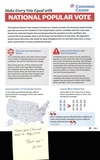
|
2022 aug 23

|
2022 aug 23

|
2022 aug 23

|
2022 aug 23

|
More... |
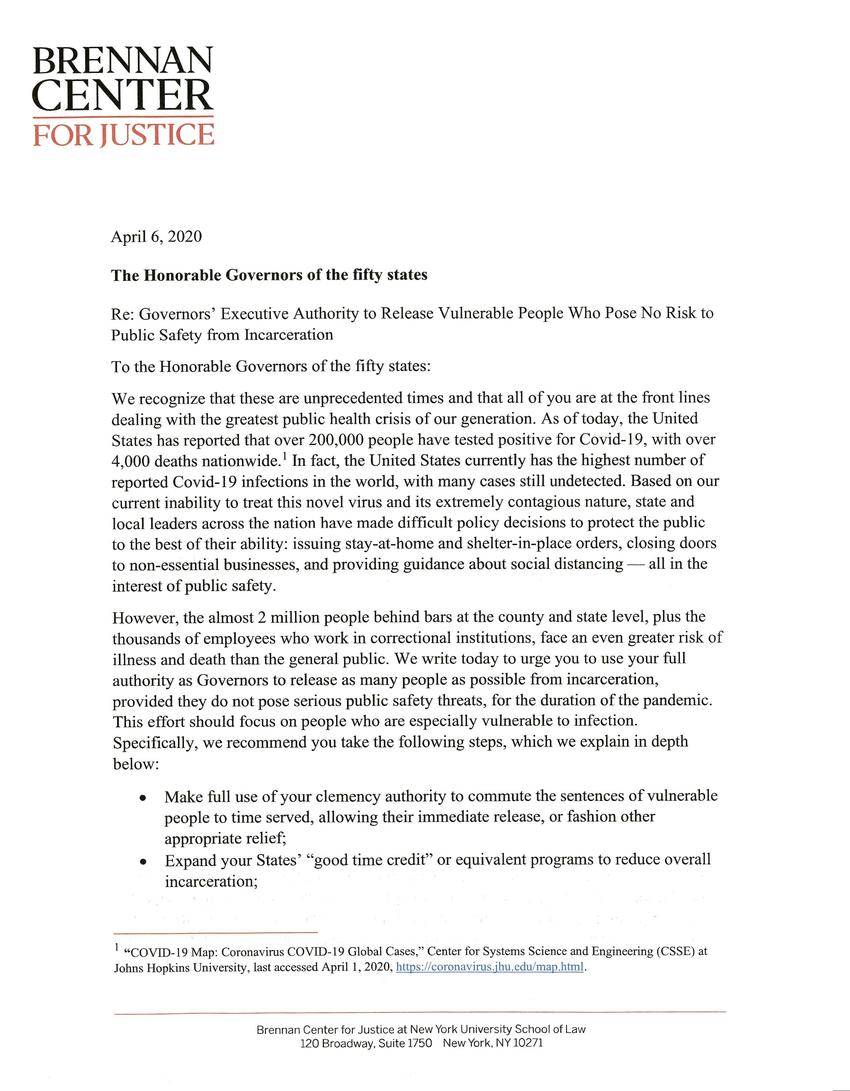
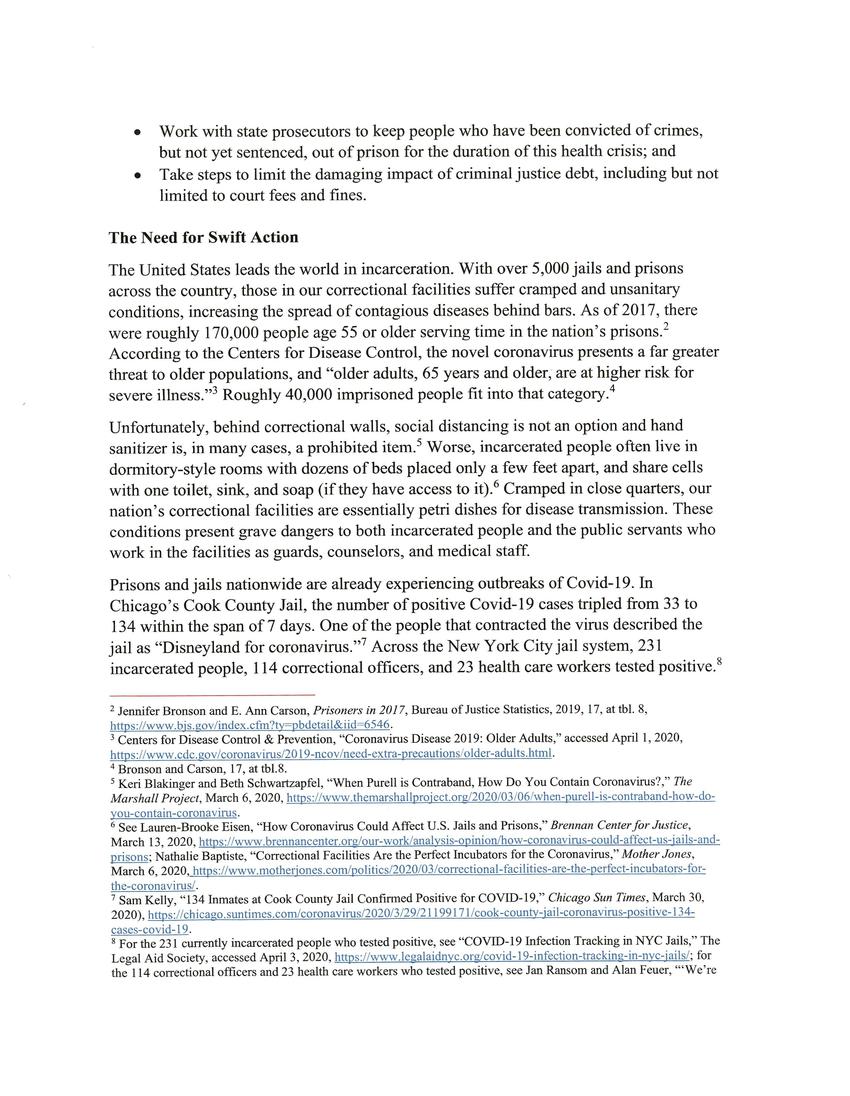
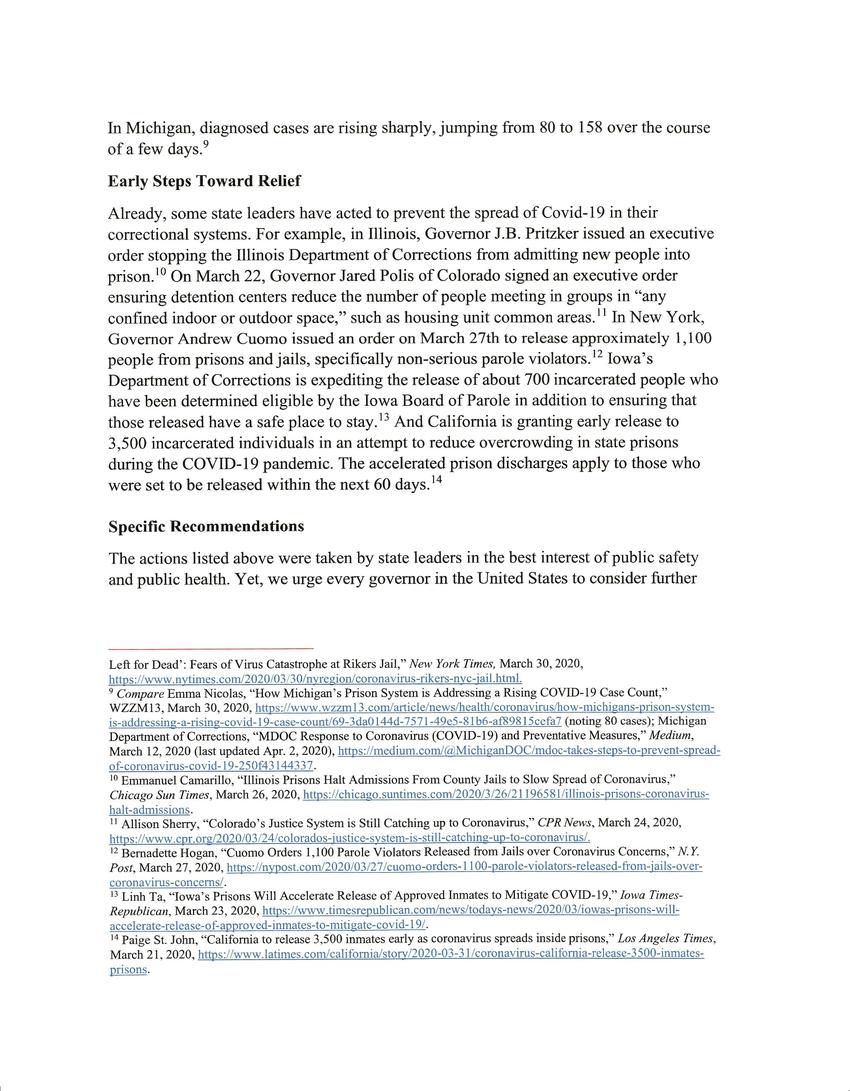
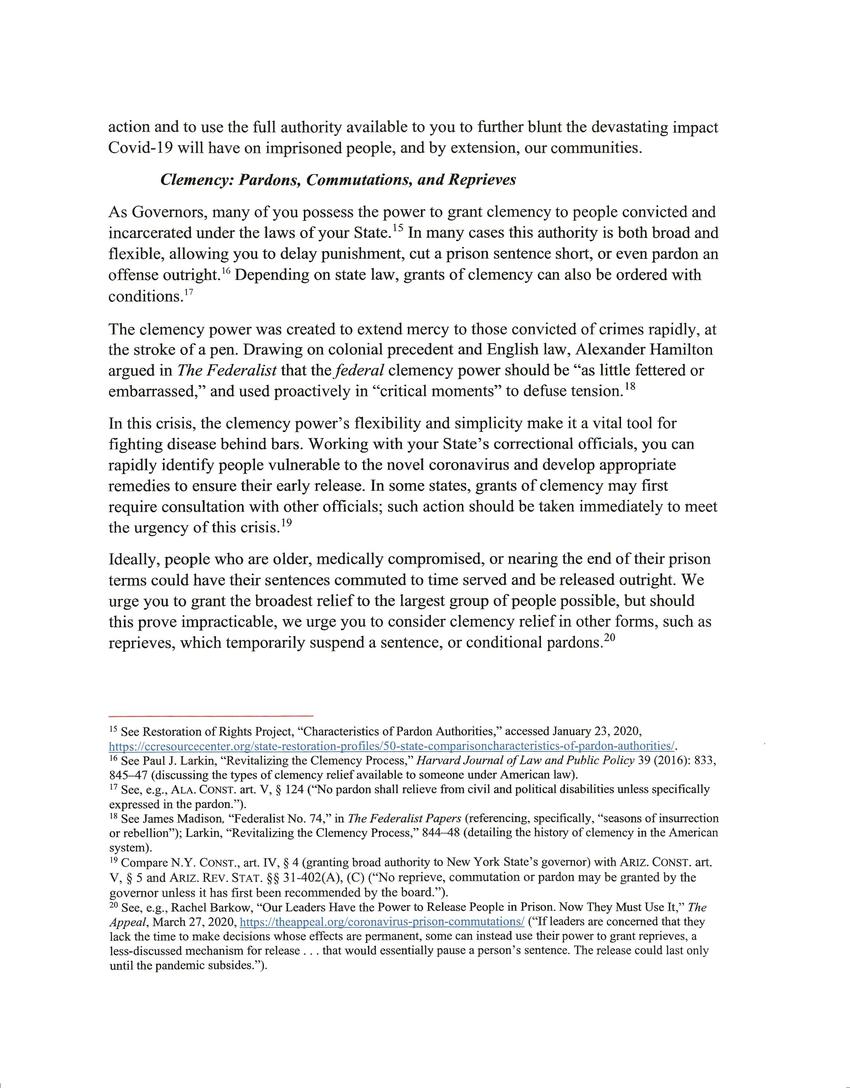
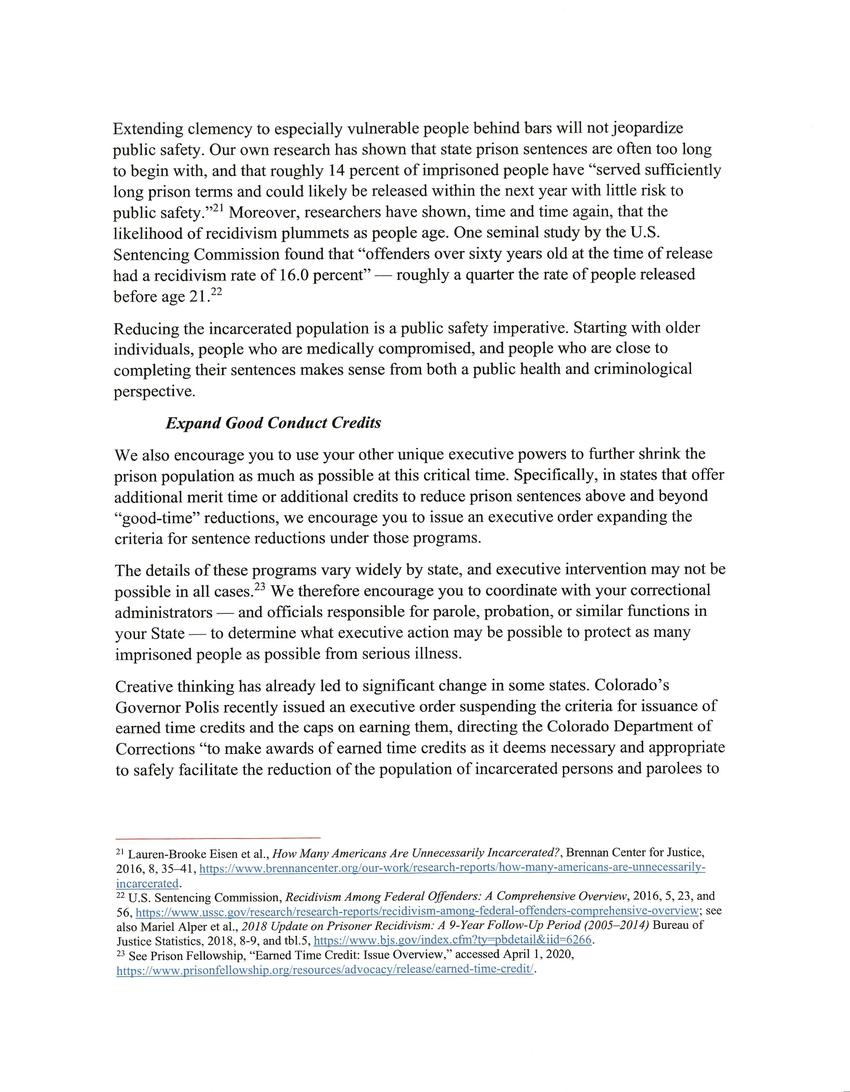
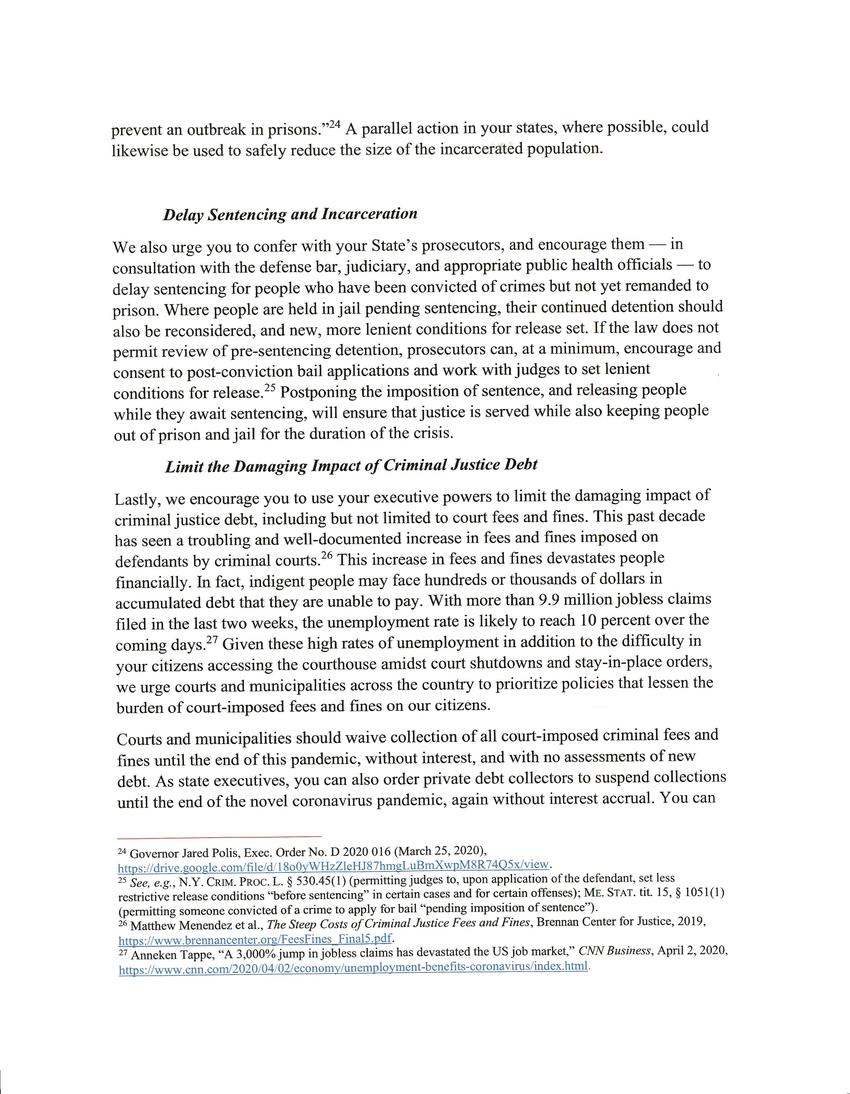

Replies